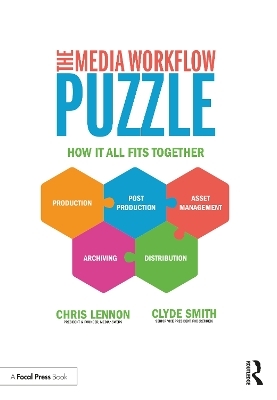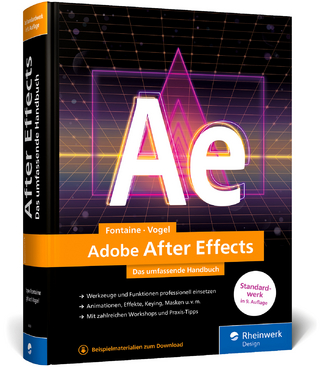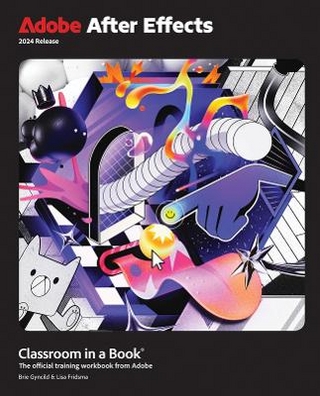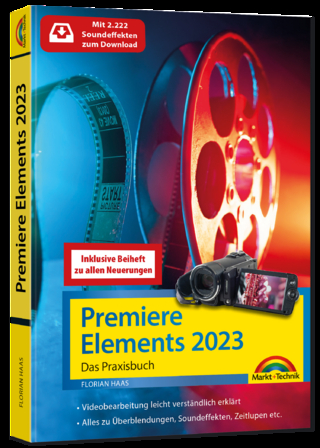
The Media Workflow Puzzle
Routledge (Verlag)
978-0-8153-9290-3 (ISBN)
The Media Workflow Puzzle gives readers an in-depth overview of the workflow process, from production to distribution to archiving. Pulling from the expertise of twenty contributing authors and editors, the book covers topics including content production, postproduction systems, media asset management, content distribution, and archiving and preservation, offering the reader an understanding of all the various elements and processes that go into the media workflow ecosystem. It concludes with an exploration of the possibilities for the future of media workflows and the new opportunities it may bring.
Professionals and students alike looking to understand how to manage media content for its entire lifecycle will find this an invaluable resource.
Chris Lennon is President and CEO of MediAnswers, a trusted advisor to the cream of the crop of media companies worldwide. He has over 30 years of experience in the media business, leading large projects on every continent except for Antarctica. He has held a variety of leadership positions in the Society of Motion Picture and Television Engineers (SMPTE), including Standards Director, Local Section Manager, Technology Committee Chair, and others. He is a SMPTE Fellow and recipient of SMPTE’s 2008 Citation. He is known as a thought leader, with a reputation built on not only working with the world’s leading media organizations, but his leadership of several leading-edge industry efforts in many diverse areas, like BXF, NABA/DPP Content Delivery Specs, PMCP, 3DTV, OBID Audience Measurement, Multilink SDI using CWDM, microservices in media, and many more. He also serves as Executive Director of the Open Services Alliance, a global industry organization focused on interoperability among microservice-oriented media systems. In his spare time, he is a championship winning race car driver, author, and high-performance driving coach, and runs Winding Road Adventures. For more details on MediAnswers, its clients, and Chris’s team, please visit www.medianswers.tv. For more details on the Open Services Alliance, please visit www.openservicesalliance.com. Clyde Smith is a Retired Former Senior Vice President, Advanced Technology for FOX Network Engineering and Operations, where he supported Broadcast and Cable Networks operating groups in addressing their challenges with technologies, standards, and regulations. Previously, he was SVP of Global Broadcast Technology and Standards for Turner Broadcasting System, Inc. In this capacity, Smith was responsible for the strategic development and planning of new technology in addition to the operational transition of media from production to broadcast to air. Smith’s broad knowledge of operational and technical systems and hands-on experience developing processes for integrating operational facilities from the ground up were vital to the Turner Entertainment Group’s continuing expansion. Prior positions include SVP of Broadcast Engineering Research and Development at Turner and SVP & CTO at Speer Communications where he managed operations of one of the nation’s first all-digital facilities. He worked for 8 years in communications design and development engineering at the Kennedy Space Center where he supported 48 shuttle missions, three interplanetary probes, and numerous Department of Defense initiatives. Smith supported initiatives that were recognized by The Computer World Honors program with the 2005, 21st Century Achievement Award and an Emmy Award for Pioneering Efforts in the Development of Automated, Server-Based Closed Captioning Systems. Smith is a frequent speaker and honored guest at meetings for SMPTE, NAB, and SBE. He served 15 years as an SMPTE Governor; he also served as a Standards Chairman and Secretary/Treasurer of the SMPTE. He also was program chair for four SMPTE advance-imaging conferences. He has often presented and published research and technology papers that he has authored or co-authored in industry magazines and at industry conferences including CES, NAB, Hollywood Professional Alliance Tech Retreats, Storage Networking World, Storage Visions, VidTrans, IBC, SMPTE, SPIE, UFVA, and SBE. He is an SMPTE Fellow and recipient of the SMPTE Progress Medal, SMPTE David Sarnoff Medal Award, and the SMPTE Outstanding Service Award as well as The Broadcasting and Cable Technology Leadership award and the Storage Visions’ Storage Industry Service Award. He is a recipient of the North American Broadcasters Association International Achievement Award and an Honorary Member of the International Association of Broadcast Manufacturers (IABM).
Contents
Introduction
Acknowledgements
Introduction
Overview
Revolution #1 – Television Enters the Scene
Revolution #2 – We Go Digital and Files Replace Physical Media
Revolution #3 – Multiplatform Distribution
Revolution #4 – Things Get Cloudy
Production
Cameras
The Types of Cameras and Their Uses
The Basics of Digital Cameras
The Implications of Camera Imaging Sensor Choice on System Requirements
The Various Forms of Color Coding & Color Spaces
What Does Gamma and Log Processing Mean?
What RAW Means and How to Digitally Process It
Compressed File Systems
Uncompressed File Systems
Common Camera Media Types
Common File Formats for Cameras
Common Production Formats
What Ingest Means and How to Organize It
Asset Management
On-set Grading
Dailies
Sources and Types of Metadata
The Role of the DIT
The Role of the Data Wrangler
eXtensible Markup Language (XML)
Key XML Terminology
Cloud Impacts
Post-Production
Introduction
Post-Production in Detail
Preparation
Technical Preparation
Post-Production Specific for TV
The End Game!
Dailies in More Depth
Editorial
Different Editorial Groups
Visual Effects (VFX)
VFX in Pre-Production
VFX in Production
VFX in Post-Production
Sound
Sound Editorial
Mixing
Predubs
Soundtrack Versions
Audio Loudness for TV and the Home
Digital Intermediate
Conforming
Image Fixing
Finishing
Color Pre-Timing and Reference Look
Mastering and Versioning Preparation
Mastering and Versioning
Mastering and Versioning Applied to TV Documentary
Titling, Captions, Subtitles, and Alternate Takes
Title Sequences
Captioning and Subtitling
Alternate Takes
Quality Control (QC)
QC for Theatrical Delivery
QC for Television
Compliance QC for Television Delivery
Content QC
Area for TV Immersive Audio QC
QC Database of QC Items
Photosensitive Epilepsy (PSE)
Sound Audibility for Television
Archive
The Future of Post-Production
Bonus Content
Special Section 1: Color Pipeline
Special Section 2: High Dynamic Range
Special Section 3: Visual Effects
Managing Your Media Assets and Workflows
Content Identification and its own metadata
Advertising
Content Identification for Programs
Business Systems
DAM/MAM Systems
Programming Workflow
Media Planning and Promotion in Linear Network and Broadcast Television
Sales/Traffic/Scheduling
Master Control Automation / Playback
How BXF Can Help
Quality Control
Annex A: Classification of QC checks
The Interoperable Master Format
Implications of IMF for Asset Management and Workflows
The Business Case for IMF
Automating Workflows
Cloud Impacts
Distribution to the Viewer
History and Evolution of Broadcast Networks and Stations
Modern Broadcast Networks and Stations
History and Evolution of Cable Systems and Cable Channels
Traditional Cable Systems and Cable Channels
History and Evolution of Satellite Television
Modern Satellite Television Systems
History and Evolution of Internet Video and OTT Services
Modern Internet Video and OTT Services
Modern Cable Systems
History and Evolution of Pre-Recorded Media
History and Evolution of Digital Cinema
Modern Digital Cinema Workflows
Mastering
Picture
Stereo Picture
Captions and Subtitles
Auxiliary Data
Other Unique Formats
Creating the Digital Cinema Package (DCP)
MXF Wrapping and Encryption
Composition Play List (CPL)
Asset Map, Volume Index, and Packing List
Key Delivery Message (KDM)
Transport
Theater Storage and Projection
Theater Management Systems (TMS)
Showtime Projection
Projector Types
Summary – The Impact of Distribution Systems on Production Workflows
Wrapup – Content Delivery to Multiple Distribution Systems
Archive and Preservation
Introduction
Why Digital Archive
Creation
Consumption
Archive
Libraries, Repositories, and Archives
Digital Library
Digital Repository and Digital Archive
Preservation
Library and Archive Science
Forever Is a Long Time
What Is an Asset?
Asset Value
The Asset Construct
Technical Metadata
Connecting Metadata and Essence
Data Scale
Enterprise and Broadcast Technology Collide
Backup
Hierarchical Storage Management (HSM)
Content Storage Management (CSM) and Active Archive
Software Defined Archive (SDA)
Build Versus Buy
Storage Technology
Solid State
Hard Drives
Optical Disc
Data Tape
Public Cloud Services
Future Technologies
Storage Classifications
Tier 0 Storage
Tier 1 Storage
Tier 2 Storage
Tier 3 Storage
Tier 4 Storage
Storage Tier Summary
The Anatomy of a Digital Archive
Storage Abstraction
Storage Orchestration
Archive Maintenance
Asset Integrity
Connecting the Bits and Pieces
Archive Transformation and Modernization
Standards-Based Digital Asset Protection
Archive eXchange Format (AXF)
Standard
A Closer Look
AXF Structures
Inside an AXF Object
History of AXF
Conclusion
Looking Ahead
Looking Deep into the Future: Al Kovalick
The Granddaddy of Exponential Laws in Electronics
The Power of the Exponential
The Evolution of Infrastructure Elements
Software Powers Media Workflows
Networking Capability and Performance
Infrastructure Rides the Exponential
The Analog and Digital S-Curves
The COTS/IP S-Curve
The SDMI S-Curve
The Public Cloud S-Curve
Contemporaneous S-Curves
Final Words
The Future Is Real
The Future is Real
Glossary of Terms
Index
| Erscheinungsdatum | 19.03.2021 |
|---|---|
| Zusatzinfo | 1 Tables, black and white; 35 Line drawings, black and white; 9 Halftones, black and white |
| Verlagsort | New York |
| Sprache | englisch |
| Maße | 178 x 254 mm |
| Gewicht | 1660 g |
| Themenwelt | Kunst / Musik / Theater ► Film / TV |
| Informatik ► Grafik / Design ► Film- / Video-Bearbeitung | |
| ISBN-10 | 0-8153-9290-7 / 0815392907 |
| ISBN-13 | 978-0-8153-9290-3 / 9780815392903 |
| Zustand | Neuware |
| Informationen gemäß Produktsicherheitsverordnung (GPSR) | |
| Haben Sie eine Frage zum Produkt? |
aus dem Bereich


